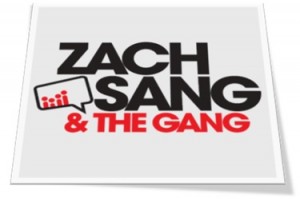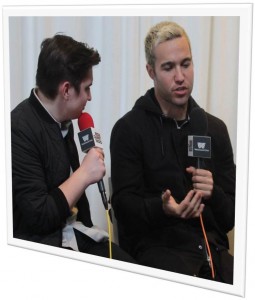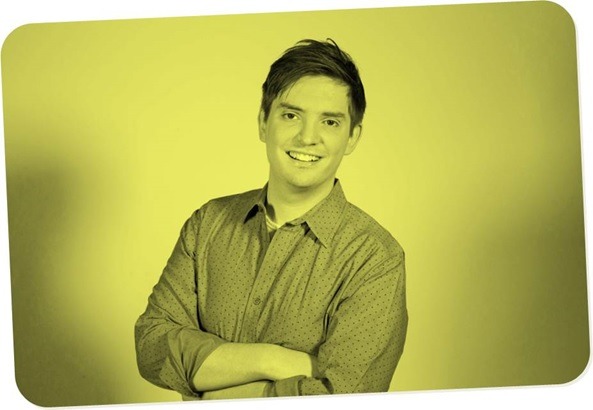Last week, we profiled the youngest honoree in our “Radio’s Most Innovative” initiative – radio host and digital star, Zach Sang. We received great responses from many in the radio business who see Zach as a shining example of how young people can use their native media skills and knowledge to make radio a more vibrant and relevant industry.
And of course, Zach is a huge fan of radio. In this second installment, he talks about his passion for radio, breaking into the business, changing media consumption, his future plans, and the digital tool kit available to any broadcaster.
So the question is, how do we find, nurture, and encourage more Zach Sangs, rather than hoping for them to find us?
JM: Give me a piece of advice for a young, aspiring broadcaster who has the passion but may not know how to get started.
ZS: I know what young broadcasters are going through right now probably better than anybody because my friends are leaving school with a ton of debt and no real path. So here’s the deal: Do it. Don’t get discouraged. Don’t wait for an opportunity to come to you. Build an opportunity. Make it yourself. Once you start something, the possibilities are truly endless.
I started a radio show while I was working at a grocery store at 14 years-old. I had no idea what was going to come out of it. If you feel in your gut and you know you have a passion for it, do not wait for an opportunity to come to you, build it yourself. Not only will your life be in gear, but you’ll also be respected for it as well.
And I’m not saying go and build a radio show from your room. I’m saying go to a local radio station and prove to them that you’re willing to work. Tell them that you’re down to do overnights and weekends for next to nothing. You want to wash the floors in the freaking studios until there’s an opening on the air, and you’ll do it for free. You don’t need to necessarily build a show. You just need to take action. You’ve got to do it yourself.
JM: What puzzles you most about the industry? What do you just look at and shake your head?
ZS: The biggest thing I ask from the radio industry is to embrace 2015 on and off the air. That’s it. The most successful radio stations in America embrace 2015 on the air. They do. I mean, look at Elvis Duran. He is such a 2015 present day show, it’s beautiful, and we’re the same way.
 JM: So give me one way for a station that is struggling with that to truly embrace the present.
JM: So give me one way for a station that is struggling with that to truly embrace the present.
ZS: I think it comes in two different forms. There is embracing 2015 on the air but it also comes with the way you get your content out there. The way you display your content and the way you interact with your audience on social media. There’s two different parts of that puzzle. You could be 2015 on the air, and then have a poor digital and brand presence.
JM: You talk about how the show talks to 18 year-old women but at one time you were talking to a much younger crowd, the Disney, Nickelodeon audience. Is there an opportunity there for radio? Are we missing that group?
ZS: I think that society has advanced and everybody wants to be older now. So when I talk to an 18 year-old, it’s because 15 or 16 year-olds aspire to be older. They want to know what their older sisters or brothers are doing. They want to know what they’re going through.
And we’re not excluding them from our conversation because a 14 year-old is on Twitter, she’s on Instagram, she’s in the loop as much as an 18 or 25 year-old would be. Sure, we try to keep it a little bit more general or broad, but you’d be surprised how many 14, 15, even 13 and 12 year-olds call me every single night with the sheets above their head and their clock radio under their blanket listening to us.
JM: You just drew a very poignant illustration of a young teen of today. But that’s also a very classic type of reference, too. Aren’t young people streaming with headphones?
ZS: We obviously need to be thinking in a streaming mindset because that’s what’s coming. But there’s a reason why radio is still the #1 mass reach medium, in particular, for Millennials and younger kids. Yes, there are a lot of kids with a phone or other technology. But what about kids where the family might not be able to afford an iPhone and the data that’s associated with it? Maybe they only have one computer in their house because they can’t afford for everyone to have a laptop.
JM: Okay, let’s expand this idea. The conventional wisdom is at 14, they don’t even care about radio, whether it’s online or on a clock radio. They’ve lost interest. But you obviously see something different.
ZS: People are consuming media differently. There’s a giant population of 14 and 15 year-olds who are obsessed with Twitter, YouTube and Instagram; they’re always online. But there’s also a segment of the population who’s still listening on a real radio in their house. It goes back to the 14 year-old who only has one Internet computer and a Boost Mobile prepaid cellphone. Her mom is probably on the computer at night or (there’s a rule that) after 9 o’clock, you can’t be on the computer. But she has a clock radio in her room.
It’s hard to say how many different types of teenagers are listening to radio and how they are consuming it, but we need to adapt to those differences and be readily available for every different listening option to win.

JM: Give me a tip for a radio talent who may be a little older, who has been on the air for a long time, and is struggling to embrace 2015.
ZS: They need be who they are completely because honesty wins. I’m a believer in honesty; that’s what makes the connection. It’s cracking the microphone and laughing with them and then an hour later crying with them. It’s all about being with them and being real, and being who you are and being personable.
But at the same time, while not losing sight of who they are because that’s what makes a talent great. It’s important to open themselves up to new possibilities and new ways of doing things. You can’t be closed off to what radio is becoming.
The best lesson I can give someone is to be open to new practices and ways of doing things without losing sight of who they are as a person and a talent.
JM: What’s the end game? What is the grand vision for where you and your brand end up?
ZS: I will forever be on the radio. Until the day I die. But it’s amplifying that and bringing different pieces to it to explore what radio can truly be. Building a show that isn’t just audio-based, it’s visual, too; it’s all encompassing, all-inclusive.
Right now for us, it’s about setting goals with my team, figuring out where we want to be next year and what do we need to do to get there. And I think for any young broadcaster, that’s a very special thing to know; realizing where you want to be and what you need to do to get there.
But you’ll see in the next few months I’m going to start pitching some radio promotions that hopefully could one day turn into a reality show or a competition series. But I want to start everything on the radio, because radio could be so much more than what it currently is, especially at night.
In morning, I feel the content being created is unreal. It’s stupid how good it is. Nights? It’s been a forgotten daypart but there’s so much more there. This is so viable; there is so much potential here, it’s unbelievable. It really is. It makes me really happy.
Thanks to Mike Stern for putting together this week’s RMI.
INNOVATION QUOTE OF THE WEEK
“The best way to predict the future is to invent it.”
Alan Kay, American computer scientist
More of Radio’s Most Innovative
- Radio’s Most Innovative: Zach Sang
- Radio’s Most Innovative: Jim Fox and KKDO’s "Like/Dislike"
- Radio’s Most Innovative: Nikki Marra’s “College Radio Road Trip”
- Radio’s Most Innovative: Andy Economos’ Selector
- Radio’s Most Innovative: Jeff Smulyan/WFAN
- What To Do If Your Radio Station Goes Through A Midlife Crisis - April 25, 2025
- A 2020 Lesson?It Could All Be Gone In A Flash - April 24, 2025
- How AI Can Give Radio Personalities More…PERSONALITY - April 23, 2025






We just picked him up in our market. It’s a very impressive team..as you can likely see from these last two weeks. I tell you..been a long time (never) that I’ve gotten on the phone with a syndication company. and they’ve said “Can we pick a different time, because Zach wants to be on the call too”
This does not surprise me in the least. Zach is a very driven young man. Thanks much, Dave.